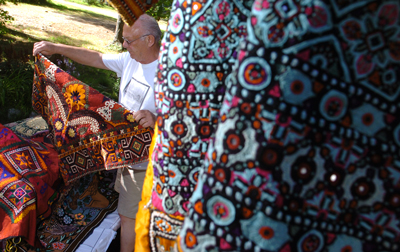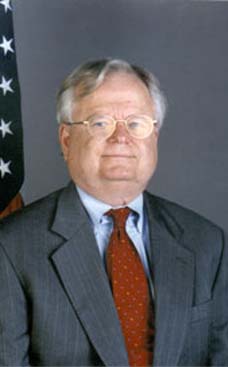
One of the items in Johnsonís collection is a wedding dress from the Sindh in Pakistan. It is fashioned of ochre, blue, magenta and purple cloth, nearly every square inch of fabric covered and made heavy with mirror embroidery, metallic threads and silver sequins. "I was told the mother begins making the wedding dress the day her daughter is born," Johnson said. The wedding dress and more than 50 other items from Johnsonís collection will be on display at the second annual Fiber College, Friday through Sunday, Sept. 7-9, at Searsport Shores Ocean Camping Resort in Searsport. This will mark the first time Johnson has exhibited his collection. In fact, until he heard about Fiber College and was invited to participate, most of his collection was packed away in trunks and, in some instances, in the boxes the items were shipped in to his home near Sacramento, Calif. "This may have been brought to Pakistan by refugees from Afghanistan," Johnson said of what appears to be a section of a tribal garment ornamented with millions of tiny cross-stitches so small you have to squint to see them. He bought the piece in the 1980s. "The refugees would need money and they would bring things they could sell [as they fled]. This may have been made by many members of the same household." Johnson believes that the popular image of the people of the region where he worked, especially those of the Muslim faith, have been adversely portrayed by the violence prevalent there. "Itís a great mistake and a tragedy," he said, to believe that the majority of Muslims there are members of the Taliban or al-Qaida. "They are like the people here, families who need to provide for themselves, who like to celebrate. They are farmers. It was easy to work with the village people."
Afghanistan RPCV Richard Johnson collects textiles from around the world
The fabric of the world
By Ardeana Hamlin
Tuesday, September 04, 2007 - Bangor Daily News
The textiles Richard Johnson collected in Nepal, Afghanistan and Pakistan during his years as a Peace Corps volunteer, a UNICEF worker and a professional health care worker sparkle with sequins and metallic threads. They gleam with the sheen of lavish embroidery and braiding. The vibrant greens, yellows, purples and blues sewn into patterns exotic to the Western eye evoke the Silk Road in the days of Genghis Khan.
"I didnít start out to collect fabrics," Johnson said. "I collected what was colorful and interesting, things that represented the culture [of the region] ó icons, pottery, carpets."
For more than 30 years, Johnson worked to bring health care systems to village people. He was assigned to Peshawar, Pakistan, as an Air Force nurse in 1959. He went to Kabul, Afghanistan, as a Peace Corps volunteer in 1965; to Katmandu, Nepal, on a USAID project in 1971; to Islamabad, Pakistan, as a community health adviser in the late 1970s, and to Karachi, Pakistan, as a trainer for doctors and nurses on prescribing and managing contraceptives, in 1996.
"It became home," Johnson said of living in the region. He learned to speak the native languages, Urdu and Dari, in order to do his work.
His work took him to small villages in the region of the legendary Khyber Pass, where the people still handcrafted and wore dress native to the region.
"The culture is extremely rich, influences go back more than 2,000 years," Johnson said. He recalled seeing ruins of buildings that were part of the landscape when Genghis Khan of the Mongol empire ruled the region. He said he saw the remains of great mosques left in the wake of British rule.
One of the items in Johnsonís collection is a wedding dress from the Sindh in Pakistan. It is fashioned of ochre, blue, magenta and purple cloth, nearly every square inch of fabric covered and made heavy with mirror embroidery, metallic threads and silver sequins.
"I was told the mother begins making the wedding dress the day her daughter is born," Johnson said.
The wedding dress and more than 50 other items from Johnsonís collection will be on display at the second annual Fiber College, Friday through Sunday, Sept. 7-9, at Searsport Shores Ocean Camping Resort in Searsport. This will mark the first time Johnson has exhibited his collection. In fact, until he heard about Fiber College and was invited to participate, most of his collection was packed away in trunks and, in some instances, in the boxes the items were shipped in to his home near Sacramento, Calif.
"This may have been brought to Pakistan by refugees from Afghanistan," Johnson said of what appears to be a section of a tribal garment ornamented with millions of tiny cross-stitches so small you have to squint to see them. He bought the piece in the 1980s. "The refugees would need money and they would bring things they could sell [as they fled]. This may have been made by many members of the same household."
Johnson believes that the popular image of the people of the region where he worked, especially those of the Muslim faith, have been adversely portrayed by the violence prevalent there. "Itís a great mistake and a tragedy," he said, to believe that the majority of Muslims there are members of the Taliban or al-Qaida. "They are like the people here, families who need to provide for themselves, who like to celebrate. They are farmers. It was easy to work with the village people."
One of the most colorful pieces in Johnsonís collection is a Ralli quilt top from Pakistan. The technique is applique and reverse applique, drawing to mind the molas of Central America or the needlework of the Hmong people of Southeast Asia. The piece was presented to Johnson as a going-away gift when he left Pakistan in 1998.
One of the most interesting pieces in the collection is a "hunting cloth" painted in black and red on golden yellow cloth. It depicts stylized birds and a leopard with a snake wrapped around its body.
"The story I was told about it," Johnson said, "is that it would be used to aid the success of a hunt."
Other items in the collection include wood-block printed fabric, a finely woven off-white pashmina embroidered with a tree of life motif, a burqa from Afghanistan, a hot-wax drawing of silver birds in a tree on silk fabric, caps, vests and rugs.
"Men do the tailoring and dressmaking," Johnson said of the fabric creations in his collection. "The women do the embroidery."
Johnsonís favorite piece is a wall hanging from Pakistan chain-stitched in wool thread and depicting elephants, exotic birds, a bear, rabbits and deer in a forest setting.
"I have so many wonderful memories of Pakistan," he said, describing the countryís wild terrain of rocks, crevices and caves. "Itís a very hostile environment even without people." Yet, he said, indicating his textile collection, so much beauty comes from it.
The pieces in his collection are not necessarily old, he said, although some he dates to the 1960s when he bought them.
Johnson will display his textile collection in a shamiyan, a tent used on festive occasions in Pakistan and India. He will be on hand to tell the stories of the pieces. He will wear a sharwal kamis, a traditional garment worn by men in Afghanistan and given to him by his colleague Dr. Fatimi, who is now the minister of health in Afghanistan.
Even though he is retired, Johnson said, he still spends time in Asia.
"You have to live in a culture in order to feel and understand it," he said.



















